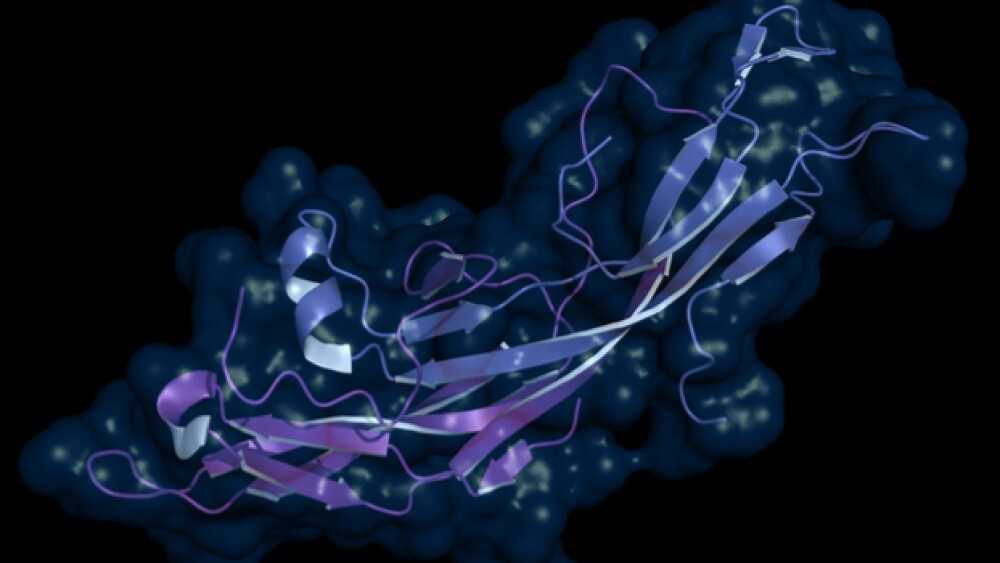It’s been a while since FSH was manufactured using the urine of menopausal nuns. But now, an Israeli company, Bio-Technology General (BTG), owned by Italian company Ferring Pharmaceuticals, has developed a genetically-engineered version of FSH that can be personalized to improve the odds of a patient getting pregnant.
Space-Filling Model of Follicle Stimulating Hormone
Follicle stimulating hormone (FSH) is commonly used in in-vitro fertilization to stimulate the ovarian follicles to produce eggs. FSH is naturally produced by the anterior pituitary gland and regulates puberty and reproduction.
The hormone, interestingly enough, was first isolated in the late 1940s by Pierro Donini, a researcher for the Swiss pharmaceutical company that would eventually become Serono. About a decade later, Bruno Lunenfeld, a medical student in Geneva, was working on infertility research. He requested large amounts of the FSH, which was a compound then named Pergonal. Here was the tricky part: the company would require thousands of gallons of urine from menopausal women. Serono turned him down.
Lunenfeld was introduced by a Serono executive to Giulio Pacelli, who happened to be the nephew of Pope Pius XII. Pacelli was also a Serono board member, and he went before the Serono board and gave essentially the same pitch that Lunenfeld did except at the end he added, “My uncle, Pope Pius, has decided to help us and to ask the nuns in the old-age home to collect urine daily for a sacred cause.” The sacred cause was related to Lunenfeld’s interest in helping Jews repopulate after the Holocaust.
As Quartz wrote in a 2016 article, “Soon, tanker trucks were hauling the pee of hundreds of nuns from Catholic retirement homes across Italy to Serono’s headquarters in Rome.”
It’s been a while since FSH was manufactured using the urine of menopausal nuns. But now, an Israeli company, Bio-Technology General (BTG), owned by Italian company Ferring Pharmaceuticals, has developed a genetically-engineered version of FSH that can be personalized to improve the odds of a patient getting pregnant. That hormone is marketed under the trade name Rekovelle.
Tal Levy, the general manager of BTG, told The Times of Israel, “The first baby has already been born with this new medication.”
Basically, BTG has engineered human cell cultures to produce FSH, which is then collected and turned into an active pharmaceutical ingredient (API). Levy said, “It took us 10 years to develop the drug in its current form.”
The hormone has a companion diagnostic test that allows doctors to predict how the women will respond to Rekovelle based on their age, weight and current hormone levels. Physicians are then able to calculate the patient’s recommended daily dosage. Typically, FSH dosages were calculated based on the patient’s reaction to the hormone, often because they will produce far more eggs than desired.
BTG both developed and manufactures the drug. BTG was founded in October 1980 by Haim Aviv and colleagues from the Weizmann Institute of Science to use the new genetic engineering techniques to create new therapeutics and medicinal compounds. The Times of Israel notes, “The firm provides end-to-end services, from developing technologies in-house or licensing them from academia, to manufacturing the products at its plants in Be’er Tuvia and shipping them to customers globally.”
Other products from BTG include human growth hormone, which is genetically engineered from E. coli, as opposed to extracting it from corpses. Another product is hyaluronic acid, which is used in cataract surgery and knee procedures to prevent erosion. It was once extracted from the crests of roosters.
One of the most prominent biotech companies in Israel, Levy told The Times of Israel, “We hope our activities in Israel, together with Ferring, will help create an ecosystem for other companies like ours to thrive. The State of Israel should promote the creation of a biotech industry here, making it possible for startups to grow locally and not just be a hub for research and development activity.”





